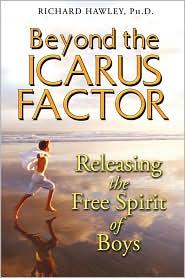Beyond the Icarus Factor: Releasing the Free Spirit of Boys

It seems that every year for the last fifteen or so, children of one gender or another are considered neglected, voiceless, constrained by social mores. In neither case is the notion wrong, but rarely are all the social implications put together. Richard Hawley, for many years the headmaster of a boys’ school in Ohio, attempts to create - through his precious book, Beyond the Icarus Factor - a wider social theory using the myth of Icarus - that all men who have moved away from their “puer spirit” (“puer” meaning “boy” in Latin), whether by choice or by social pressure, are dissatisfied and live a life mired in, if not self-disgust, certainly self-distaste.
Richard Hawley’s book is poetic without being purposeful, idealistic without actually becoming interesting. The thesis he attempts to construct around the tragic myth of Icarus and Daedalus (and Daedalus’s oft-forgotten foster son, Perdix, whom Daedalus had killed before Icarus’s birth, lest Perdix’s talent threaten Daedalus’s established reputation) is vague and uncompelling. Hawley muses on Antoine de Saint-Exupéry as the ideal balance of “puer spirit” and adulthood, trashes psychoanalysis for destroying transcendence, but at no point does he move his (admittedly well-researched) work from the realm of the fluffy to the realm his students actually inhabit on a daily basis. His final chapter exudes us to appreciate the “ecstatic spirit afoot and aloft in the world,” but aside from keeping boys safe and loved he offers us little guidance on how this change, which he seems to view as a social revolution, is to be achieved.
Hawley’s social application of the myth of Icarus does have a strange poetic appeal to it, and my mistake may have been to come to the book with the expectation of rigorous social critique or social science. Instead of thoroughly addressing what he seems to consider a pressing social concern, Hawley explains how various works of literature (from Peter Pan _to _The Little Prince) are fantasies of boyhood, without delving into that fantasy’s relationship to reality. Hawley clearly has the knowledge for and interest in that relationship, but the connection sadly makes minimal appearance in his book.